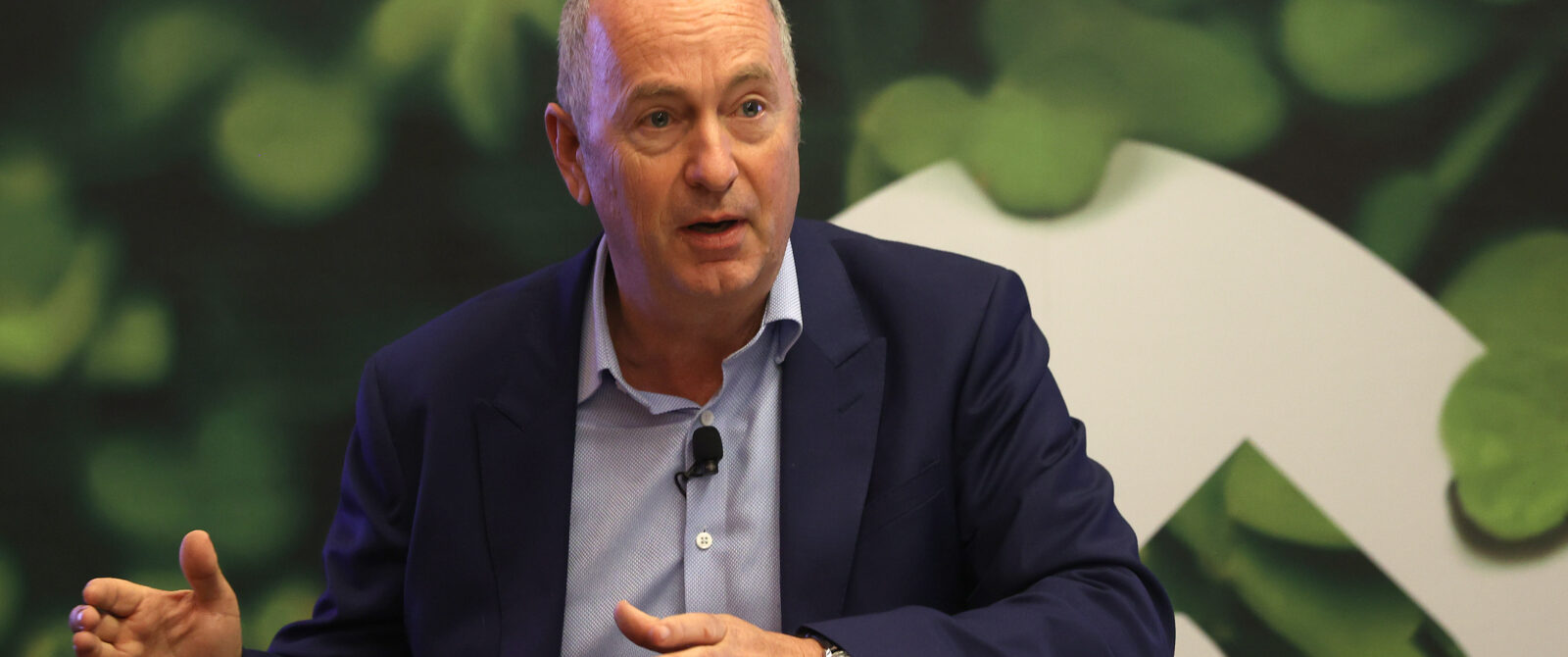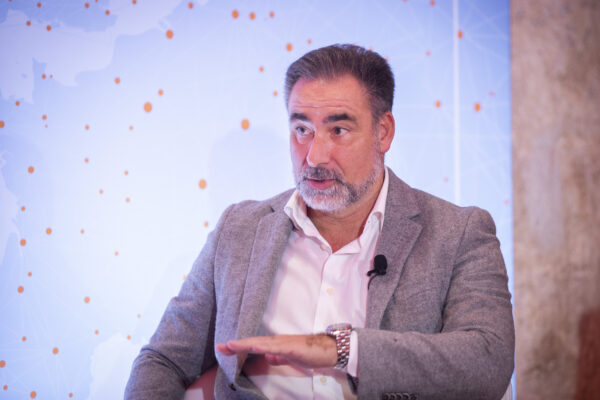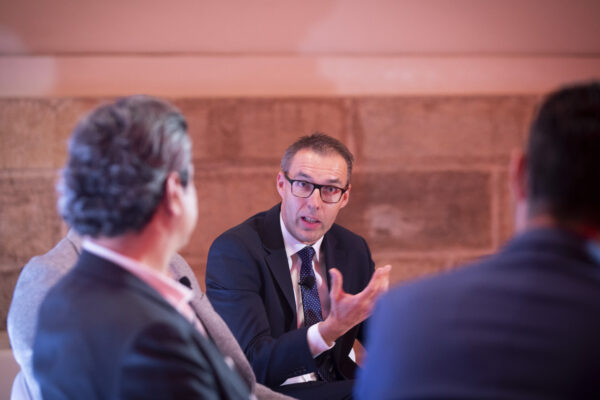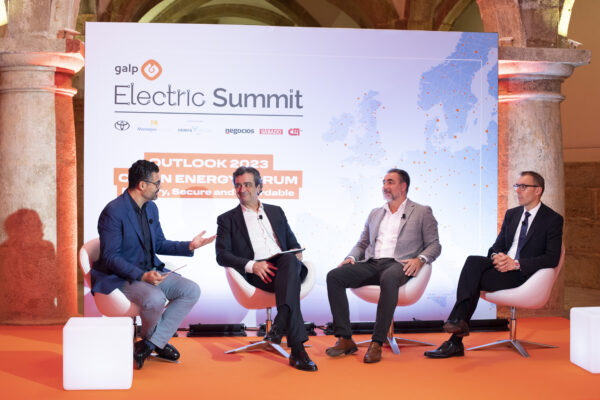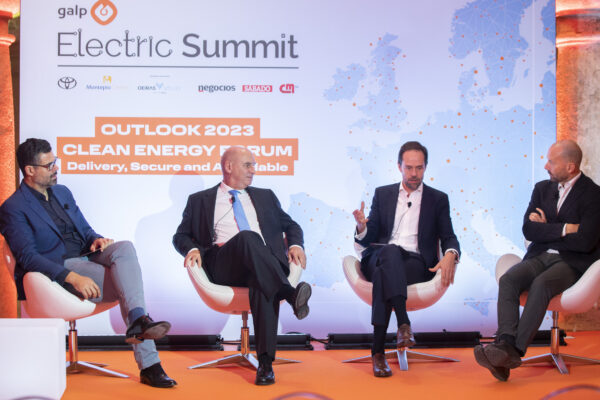“These are challenging times, but they are also stimulating for the energy industry”
Andy Brown, the CEO of Galp, explains what’s being done in terms of decarbonisation of the business and energy transition, and what’s at stake with this process.
Decarbonising the economy is a process which companies and society as a whole are now rolling out in order to lessen the impact of climate change. Switching over to a new form of power consumption, based on clean energy, requires profound changes to the way in which produce and consume energy. Are power companies going to be able to make the transition? Are we ready? Galp’s CEO, Andy Brown, tells us what they’re doing in this sphere, and leaves a message for those who want to speed up the process without first assuring energy security for the nation.
Galp, like other oil & gas companies, has sought to make the energy transition and reduce the fossil component. How is this goal being met, in light of the European and global agenda?
We have been moving quickly towards our goals in all of our businesses. In solar power, we are currently the second biggest producer in Iberia, with more than 1 GW of capacity in operation, and we just doubled our projects under development, with a major acquisition in Brazil. We are building a lithium conversion unit in Setubal with Northvolt, the leading European battery producer. We have just decided to build a small scale electroliser that will allow us to produce our first molecules of green hydrogen in Sines, and we are also aiming to kickstart two industrial scale 100 MW projects, one with partners, another one by ourselves.
These are very challenging times, but also exciting for the energy industry. Everything is changing so quickly. In our traditional mobility business, things are really picking up pace. In 2010, when we opened our first charging point, only 18 electric cars were sold in Portugal. So far this year, there were almost 10,000 electric cars sold, which was 35% more than in the same period of last year. We are keeping pace with that change: at the end of 2021, we had more than 1000 charging points in operation, and we are doubling that number this year.
The transition involves high costs and a lot of investment, but it also involves risks. For Galp as a company, what are the main risks involved in this transformation?
The biggest risk is to do nothing. The world is changing so fast that we need not just to respond to that change, but to lead it, providing our clients with competitive and sustainable energy solutions. One thing we must be careful is to ensure that this broad transformation of the energy system is in fact a transition, in which companies can develop their long-term business plans with a certain degree of predictability. If we want to have a proper transition – rather than a disruption – we will need a reliable supply of traditional energy sources, namely natural gas, but also oil. And we need to keep investing in those sources until we have enough renewables to ensure security of supply.
The war in Ukraine has changed the urgency of the discussion on transition and energy independence. Has the problem become clearer?
It became a lot more obvious that we need to cut our dependency on unstable energy providers like Russia. It is also clear that we need to step-up producing our energy from local sources, such as the wind and the Sun. Finally, it also became more evident that we must make sure the energy we rely on today continues to be available and affordable to consumers.
Has there been any change in the strategy that was being followed? Are planned investments being rethought in light of the war?
No, we are moving ahead with our strategy. The only decision we have taken because of the war was to stop buying oil products from Russia, which was an important supplier of vacuum diesel. We took that decision because when our fundamental values are at stake, we must stand up for them and that’s what we did. We also stepped-up our efforts to help those in direst need, by supporting refugees and increasing discounts to our customers.
From the consumer’s point of view, it is important to have a “greener” product offer?
This is a societal change in which everyone needs to do their part. As an energy company, we must provide the means for society to make that transition. But we will only succeed in this endeavor if consumers are willing to take-up the new products and energy sources that we offer. There must be a market for it. Consumers have to be educated about their options and adopt responsible behaviors. But these alternatives must be affordable. That sometimes calls for new laws and regulations to speed up change. Let’s give an example – green hydrogen is more expensive than natural gas. We need to make sure it becomes competitive by incorporating the cost of emissions in the competing alternatives. That requires action on the part of Governments. So, the speed of change will depend on the capacity of Governments in Europe to work along-side industries in strategic partnerships to bring about balanced regulatory and licensing frameworks so that all these exciting changes can happen quickly.
Demand for fossil fuels, for the time being, is not decreasing. Will the day come when Galp will be a company “beyond petroleum”?
Galp is in fact already a lot more than petroleum. While our upstream oil and gas production business still accounts for the majority of our earnings, it represents less than of our investments, as our priority moves to building a portfolio of sustainable businesses that will drive our growth from the 2030s onwards, progressively replacing fossil fuels. We’re talking about renewables, about green hydrogen, about lithium conversion for the battery value chain, sustainable low-carbon fuels, advanced biofuels, electric mobility, corporate and urban fleet management, but also decentralized solar energy production for self-consumption. We will grow those low carbon businesses, which will become the core of the company in the decades to come. By 2050 we have an ambition to be net zero CO2, by this time we will be definition need to be ‘beyond petroleum’ to meet this ambition.
The increasing drive towards electrification requires the production of lithium batteries, which is also detrimental to the environment. How can this balance be resolved?
Balance is really the keyword here. There are no miracle solutions to the energy equation, but we simply can’t go on pretending that the actions we take today have no costs in the future. We know what the consequences of continuing to burn fossil fuels are, because they are already upon us. We must find alternatives and make sure we can develop them in sustainable ways. That’s what we aim to achieve in every stage of the lithium value chain that we are putting together with Northvolt, featuring the conversion plant in Setúbal, which will be one of Europe’s largest and the most sustainable. The fossil fuel energy system has a footprint detrimental to the climate, the footprint of new energy system will not be zero, it will require renewable energy generation from wind and solar and also the extraction and processing of raw materials for the manufacture of the components needed for the new energy system.
In terms of investment, what does being “greener” entail? Where do you invest?
Galp has an ambition to achieve carbon neutrality by 2050 and a 40% overall reduction in our emissions by 2030. All the projects that contribute to these targets are green investments, because these goals are not abstract, but rather the aggregate result of the specific projects we have under development – the exponential growth in renewable energy, of which the acquisition this month (May) of a large 4.8 GW portfolio of solar and wind energy projects under development in Brazil is a good example; a commitment on green hydrogen and low-carbon fuels, namely for aviation or maritime transport; the promotion of a battery value chain in Europe; electric mobility… there are many challenges ahead of us – and just as many opportunities.
The change in the business paradigm will force Galp to continue investing in Portugal and abroad. How is that investment split?
Energy is one of the most global industries in the world and our businesses clearly show that – most of our earnings come from Brazil, we are also present in many African countries and the bulk of our refining and retail businesses is in Iberia. Our transformation is also a global effort. Much of our growth in renewables will be coming from Spain and Brazil, but we also have a giant and very promising LNG project in Mozambique. We will be investing considerably in green hydrogen in our industrial base in Sines, and it may make sense to replicate that in other geographies where we also have a strong renewable energy capacity, like Brazil.
How does the market see this transition?
We are in a transition moment in which many investors are concerned about the returns of investments in renewable energies, but others are worried about the sustainability of investing in traditional oil & gas projects, which came under pressure in the recent past. It’s our responsibility to prove that we can build a sustainable business that can bring profitable growth to shareholders, while responding to society’s needs. I believe Galp has been doing a good job in building a balanced case to answer both of these perspectives.
What is the Electric Summit about? What are the objectives of this initiative?
The Electric Summit aims to be the place to think and discuss energy transition and sustainable mobility in Portugal. Our program includes two days of conferences, with experts in sustainability, technology and engineering, managers, and decision makers. It also includes a roadshow through several Portuguese municipalities. The event aims to involve companies, governments, the media and, above all, citizens in this dialogue on how to build a decarbonized and more energy-efficient future. Knowledge and energy literacy are thus the two essential pillars of the Galp Electric Summit. This is the only way to we can move towards a new and more inclusive energy paradigm. Our roadshow is, therefore, another step in this direction: we want to be close to people and show them what we, as an energy company, are doing to regenerate the future.


